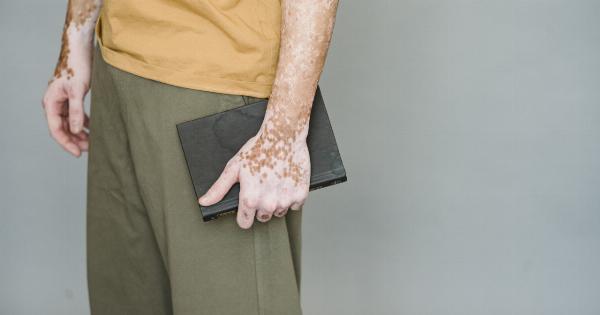When it comes to skin health, prevention is always the best approach. But if you’re experiencing any of the following skin concerns, it’s time to make an appointment with a dermatologist as soon as possible.
Here are the top 30 warning signs that you need to see a dermatologist:.
1. Persistent Acne
If your acne isn’t responding to over-the-counter treatments or is leaving scars, a dermatologist can help determine the best course of treatment to minimize breakouts.
2. Skin Lesions That Won’t Heal
Any spot or lesion on your skin that persists for more than a few weeks and doesn’t respond to basic first aid should be evaluated by a dermatologist, as it may be a sign of skin cancer.
3. Changes in Skin Color or Texture
If you notice that your skin looks different, whether it’s in terms of color or texture, it’s important to have it evaluated by a dermatologist to rule out any serious underlying conditions.
4. Excessive Sweating
If you’re sweating more than usual, even when you’re not physically active, a dermatologist can recommend treatments to help reduce excessive sweating.
5. Unexplained Hair Loss
If you’re noticing hair loss that isn’t explained by genetics or other factors, a dermatologist can help determine the underlying cause and recommend appropriate treatment.
6. Chronic Skin Itching
If you’re experiencing persistent itching or scratching, it may be a sign of an underlying skin condition, such as eczema, psoriasis, or contact dermatitis. A dermatologist can help diagnose and treat the problem.
7. Skin Tags or Growths
If you’re noticing small, flesh-colored growths on your skin, a dermatologist can safely remove them and determine if they are a sign of a more serious condition.
8. Excessive Sunburns
If you’re experiencing frequent or severe sunburns, even with appropriate sunscreen use, it’s important to have your skin evaluated for any underlying conditions or signs of sun damage.
9. Dry Skin That Won’t Improve
If you’re experiencing overly dry skin that doesn’t seem to improve with moisturizers, a dermatologist can help determine the underlying cause and recommend effective treatments.
10. Recurring Rashes
If you’re experiencing recurring rashes, it’s important to have them evaluated by a dermatologist to rule out any underlying conditions such as allergies or infections.
11. Ingrown Hairs
If you’re prone to ingrown hairs, a dermatologist can recommend the best hair removal methods and treatments to help prevent future ingrown hairs.
12. Psoriasis
If you’re experiencing psoriasis, a dermatologist can help diagnose the condition and recommend the most effective treatments to manage symptoms and improve your quality of life.
13. Eczema
If you’re experiencing eczema, a dermatologist can help identify the triggers and recommend the appropriate treatments to manage the condition and prevent flare-ups.
14. Rosacea
If you’re experiencing rosacea, a dermatologist can help diagnose the condition and recommend the most effective treatments to manage symptoms and improve your quality of life.
15. Wrinkles and Fine Lines
If you’re concerned about wrinkles and fine lines, a dermatologist can recommend treatments such as Botox or fillers to help reduce signs of aging and improve your skin’s appearance.
16. Age Spots
If you’re noticing brown or gray spots on your skin, a dermatologist can help determine if they are age spots or a sign of a more serious condition and recommend appropriate treatment.
17. Skin Cancer
If you’re concerned about skin cancer, a dermatologist can perform a skin exam to check for any suspicious moles or lesions and recommend appropriate treatment if necessary.
18. Melasma
If you’re experiencing melasma, a dermatologist can recommend the most effective treatments to reduce the appearance of dark spots on your skin.
19. Scars
If you’re concerned about scarring from acne or other injuries, a dermatologist can recommend treatments such as laser therapy or chemical peels to reduce the appearance of scars.
20. Varicose Veins
If you’re experiencing varicose veins, a dermatologist can recommend treatments to reduce the appearance of these veins and prevent further complications.
21. Spider Veins
If you’re experiencing spider veins, a dermatologist can recommend treatments to reduce the appearance of these veins and prevent further complications.
22. Nail Fungus
If you’re experiencing nail fungus, a dermatologist can help diagnose the condition and recommend effective treatments to manage the infection and prevent future outbreaks.
23. Athlete’s Foot
If you’re experiencing athlete’s foot, a dermatologist can help diagnose the condition and recommend effective treatments to manage the infection and prevent future outbreaks.
24. Warts
If you’re experiencing warts, a dermatologist can safely remove these growths and help prevent them from coming back.
25. Cold Sores
If you’re experiencing cold sores, a dermatologist can recommend effective treatments to manage the infection and prevent future outbreaks.
26. Shingles
If you’re experiencing shingles, a dermatologist can diagnose the condition and recommend treatments to manage symptoms and prevent complications.
27. Molluscum Contagiosum
If you’re experiencing molluscum contagiosum, a dermatologist can recommend effective treatments to manage the infection and prevent future outbreaks.
28. Impetigo
If you’re experiencing impetigo, a dermatologist can help diagnose the condition and recommend effective treatments to manage the infection and prevent future outbreaks.
29. Ringworm
If you’re experiencing ringworm, a dermatologist can help diagnose the condition and recommend effective treatments to manage the infection and prevent future outbreaks.
30. Fungal Infections
If you’re experiencing fungal infections such as jock itch or tinea versicolor, a dermatologist can help diagnose the condition and recommend effective treatments to manage the infection and prevent future outbreaks.
Conclusion
If you’re experiencing any of the above skin concerns, it’s important to seek the advice of a dermatologist as soon as possible to ensure prompt diagnosis and appropriate treatment.
With the right care, your skin can remain healthy and vibrant for years to come.






























